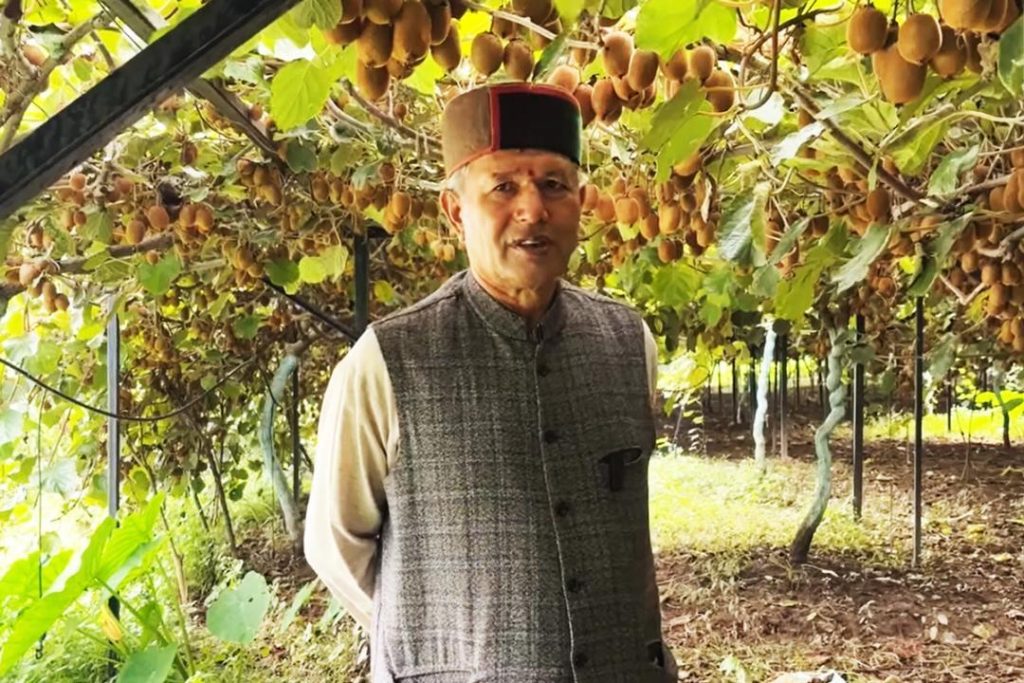
Title: Solan farmer earns ₹21 lakh/acre with organic kiwi farming
In a remarkable achievement, a farmer from Solan, Himachal Pradesh, has earned ₹21 lakh per acre by adopting organic kiwi farming. Pratap Bharnal, a seasoned farmer, has successfully ventured into kiwi farming, leaving behind the traditional apple farming that was facing declining rates. His innovative approach to farming has not only increased his income but also contributed to the growth of the organic farming sector in the region.
Pratap Bharnal’s Journey into Organic Kiwi Farming
Pratap Bharnal, a 45-year-old farmer, has been involved in farming for over two decades. Initially, he focused on growing apples, which were once a lucrative crop in the region. However, over the years, he noticed a significant decline in the demand and prices of apples. This prompted him to explore alternative options to diversify his farm and ensure a sustainable income.
In 2017, Bharnal decided to venture into kiwi farming, which was relatively new to the region. He started by planting 100 kiwi saplings on his 1-acre farm. With the help of his family, he nurtured the saplings using only water and cow dung manure. The initial yield was modest, but Bharnal was determined to make organic kiwi farming a success.
Years of hard work and dedication have paid off for Bharnal. Today, his farm is home to 400 kiwi plants, yielding an average of 52 kg of kiwis every season. The remarkable yield has enabled him to earn a staggering ₹21 lakh per acre, making him one of the most successful organic kiwi farmers in the region.
The Secret to Bharnal’s Success
So, what sets Bharnal’s farm apart from others? The answer lies in his commitment to organic farming practices. By using only natural methods to fertilize and irrigate his crops, Bharnal has been able to maintain soil health and reduce his environmental footprint.
“I never believed in using chemical pesticides or fertilizers,” Bharnal said in an interview. “I knew it would harm the soil and the environment. Instead, I opted for cow dung manure and water, which has worked wonders for my kiwi plants.”
Bharnal’s approach to farming has not only benefited the environment but also the local community. His farm has become a model for sustainable agriculture in the region, inspiring other farmers to adopt organic farming practices.
The Benefits of Organic Kiwi Farming
Organic kiwi farming offers several benefits, including increased soil health, better crop yield, and reduced environmental impact. Bharnal’s success story is a testament to the potential of organic farming, which is gaining popularity globally.
Here are some of the benefits of organic kiwi farming:
- Increased soil health: Organic farming practices promote soil health by using natural methods to fertilize and irrigate crops. This leads to improved soil structure, increased biodiversity, and better water retention.
- Better crop yield: Organic farming practices can lead to higher crop yields due to the improved soil health and reduced stress on the plants.
- Reduced environmental impact: Organic farming reduces the use of chemical pesticides and fertilizers, which can contaminate soil, water, and air. This leads to a healthier environment and reduced greenhouse gas emissions.
- Increased profitability: Organic kiwi farming can be more profitable than conventional farming due to the demand for organic produce and the potential for higher prices.
Challenges and Opportunities
While Bharnal’s success story is inspiring, organic kiwi farming is not without its challenges. Some of the challenges faced by organic kiwi farmers include:
- High initial investment: Organic kiwi farming requires a significant initial investment in planting saplings, infrastructure, and labor.
- Limited market access: Organic kiwi farmers often face challenges in accessing markets due to the lack of infrastructure and demand.
- Climate change: Climate change can impact kiwi yields and quality, making it essential for farmers to adapt to changing weather patterns.
Despite these challenges, the demand for organic kiwi is increasing, and opportunities are emerging for farmers to capitalize on this trend. With the right strategies and support, organic kiwi farming can become a lucrative and sustainable business.
Conclusion
Pratap Bharnal’s success story is a testament to the potential of organic kiwi farming. His commitment to using natural methods to fertilize and irrigate his crops has allowed him to earn a remarkable ₹21 lakh per acre. As the demand for organic produce continues to grow, it is essential for farmers to adopt sustainable farming practices and explore alternative crops like kiwi.
Bharnal’s story serves as a model for farmers looking to diversify their farm and increase their income. With the right support and resources, organic kiwi farming can become a viable and profitable business, benefiting both farmers and the environment.






